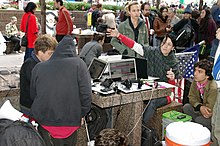
Back نشاط إعلامي Arabic אקטיביזם תקשורתי HE Մեդիա ակտիվիզմ Armenian Mediattivismo Italian Media-activisme Dutch Midiativismo Portuguese 媒體行動主義 Chinese
This section may contain material not related to the topic of the article. (May 2013) |
This article appears to be slanted towards recent events. (May 2013) |

Media activism is a broad category of activism that utilizes media and communication technologies for social and political movements. Methods of media activism include publishing news on websites, creating video and audio investigations, spreading information about protests, or organizing campaigns relating to media and communications policies.
Media activism is used for many different purposes. It is often a tool for grassroots activists and anarchists to spread information not available via mainstream media or to share censored news stories.[1] Certain forms of politically motivated hacking and net-based campaigns are also considered media activism. Typically, the purpose of media activism is to spread awareness through media communications which sometimes leads to action.[2]
Media activism gives disadvantaged groups the ability to have their own voices heard and organize in bigger groups allowing for more autonomise activism to enact social change.[3] As well as disadvantaged communities, media activism allows younger generations to have a voice in situations where legally they cannot - for example when they are too young to vote. The internet allows for these individuals to avoid feeling helpless when they cannot vote.[4] This is a free way for leaders to organize and allows more individuals interested in engaging with certain movements online rather than in person to speak up.[5] On the other hand, this is also a common form of activism for celebrities to use and there is debate on how effective it really is.[6] One criticism of Media Activism is that since everyone has a voice radicals sound as loud as the average whether it’s one person or not which can undermine the movement entirely.[7]
- ^ Kim Deterline. "FAIR's Media Activism Kit". Retrieved December 19, 2012.
- ^ Andors, Ph.D., Ellen (2012). The Task of Activist Media. Peoples Video Network.
- ^ Cammaerts, Bart (2015-02-11). "Social Media and Activism". The International Encyclopedia of Digital Communication and Society: 1–8. doi:10.1002/9781118767771.wbiedcs083. ISBN 9781118290743.
- ^ "The Darker Sides of Social Media Activism". 19 December 2019.
- ^ Bimber, Bruce (March 2001). "Information and Political Engagement in America: The Search for Effects of Information Technology at the Individual Level". Political Research Quarterly. 54 (1): 53–67. doi:10.2307/449207. JSTOR 449207.
- ^ Williams, Melvin L. (2020-06-28). "Social media's commodified, transgender ambassador: Caitlyn Jenner, celebrity activism, and social media". Celebrity Studies. 13: 20–38. doi:10.1080/19392397.2020.1782236. ISSN 1939-2397. S2CID 225751271.
- ^ Bennett, W. (January 2003). "Communicating Global Activism". Information, Communication & Society. 6 (2): 143–168. doi:10.1080/1369118032000093860a. ISSN 1369-118X. S2CID 143665342.
© MMXXIII Rich X Search. We shall prevail. All rights reserved. Rich X Search